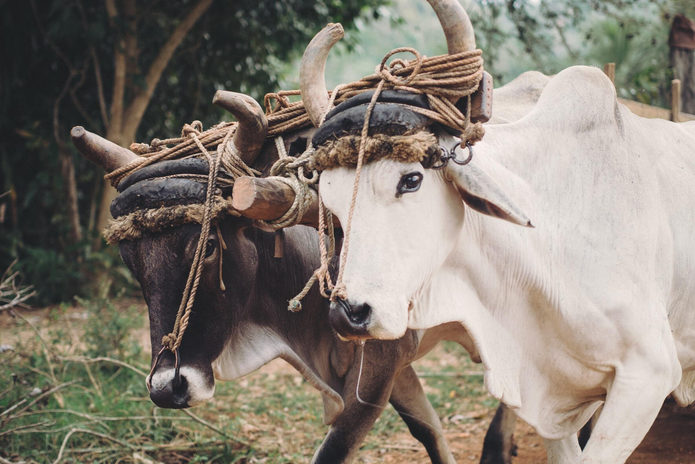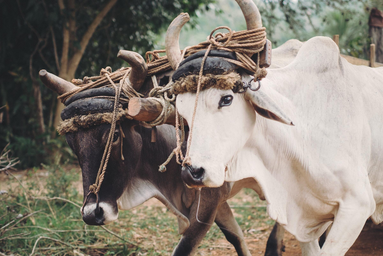The day on which the Chinese New Year is celebrated varies from year to year. In the Western calendar, it takes place somewhere between late January and late February (01/22–02/22). In 2021, the Chinese New Year is celebrated on February 12, meaning that after a year which felt like an eternity, we have finally entered the year of the Ox (in Chinese niú or 牛, also known as bull, cow or water buffalo). What does this mean exactly?
The Chinese New Year
Besides in China proper, the Chinese New Year is celebrated in countries with significant Chinese populations. Variations of the festival are also celebrated in the sphere of Chinese cultural influence, for instance, in Korea and Vietnam. The first day of the year is determined based on a traditional lunisolar calendar, so the length of the year fluctuates; the year traditionally starts on a second new moon after the winter solstice. The celebrations and their motivations have varied throughout the dynasties, but what is most relevant to the festival has been that of the onset of spring season (yeah, well, I heard that we might be getting a very lovely Spring sometime after the wintery February). The festivities start days before the actual New Year’s Eve and continue after that, including worshipping forefathers, buying gifts, shooting fireworks to scare off demons, lighting red lanterns, hanging New Year’s posters and dancing, among other things.
The Zodiac Animals
The system where each year is granted an animal figure according to the Chinese zodiac is also followed in the countries that have been historically influenced by Chinese culture. The origin of the zodiac system is uncertain. For the Western audience, these animal characters are the most familiar as representatives of the ‘Chinese Horoscope’, which is often used similarly to Western Horoscope to determine the basic characteristics of a person born during a given year. However, there are some obvious pitfalls in such orientating of foreign concepts.
For example, the Chinese zodiac isn’t particularly used for forecasting the immediate future (so the tradition of weekly “Horoscopes”, where you meet tall strangers or someone you know tells you something you don’t know, isn’t really a thing). There are other significant differences to the Western tradition too, such as the given qualities and features of a year itself, varying according to the granted animal.
The animals follow each other in a twelve-year cycle and this year we enter the second year in the circulation. Each year is also assigned one element out of five which affects the personality of the people born that year. The infant year 2021 (lasting until the end of January 2022) is a year of the Metal Ox. Because there are twelve animals and five elements, the last time the Metal Ox ruled their own year was in 1961. Many Western adaptations also fail to note that the only zodiac animal that affects a person’s life isn’t the animal of the solar year, since there is also an animal for each month, day and hour!
If you are interested, you can use Four pillar calculators online to discover your complete set of animals.
The Year of the Ox
Looking back at the year of the Rat (last year, that is), it should have been a great year to take risks and look for new beginnings. Well, I cannot completely put it past that year since many people did take up new projects in the form of hobbies such as reading, painting and knitting! Barry Fantoni writes in his already (rather comically) out-of-date book that some of the developments in the year of the Rat can be “awkward” as well. I say! (He also states that the year of the Rat is a splendid year for theaters which, I guess, goes to show that you should never take the characterizations too literally.)
As for now, the time of opportunistic behavior has come to an end and we are entering the year of work, work and work. As many people are already tired of surprises, uncertainties and ‘new situations’, it might sound comforting that the year of the Ox is the year of careful planning, slow developments and preparing for the future.
The Ox as a zodiac animal is associated with diligence, determination and the “no bullsh*t” attitude (hah!). They are also proud and secretive about their inner thoughts, never admitting weakness. In traditional folklores concerning the origin of the zodiac, the Ox was the second to finish the race of the animals and would have been the first if the Rat hadn’t been witty enough to stowaway on its back. Consequently, the people born in the year of the Ox are believed to be tenacious, persistent, dutiful, organized and resourceful. The year of the Ox is a great time, then, to work on projects that take hard work and orderliness, such as writing or publishing a book.

Happy year of the Ox!
A Treasure chest online about all things Chinese New Year: https://chinesenewyear.net/
The book referred to in the article is Chinese Horoscopes by Barry Fantoni, first edition published by Sphere in 1985, revised edition 1991.



